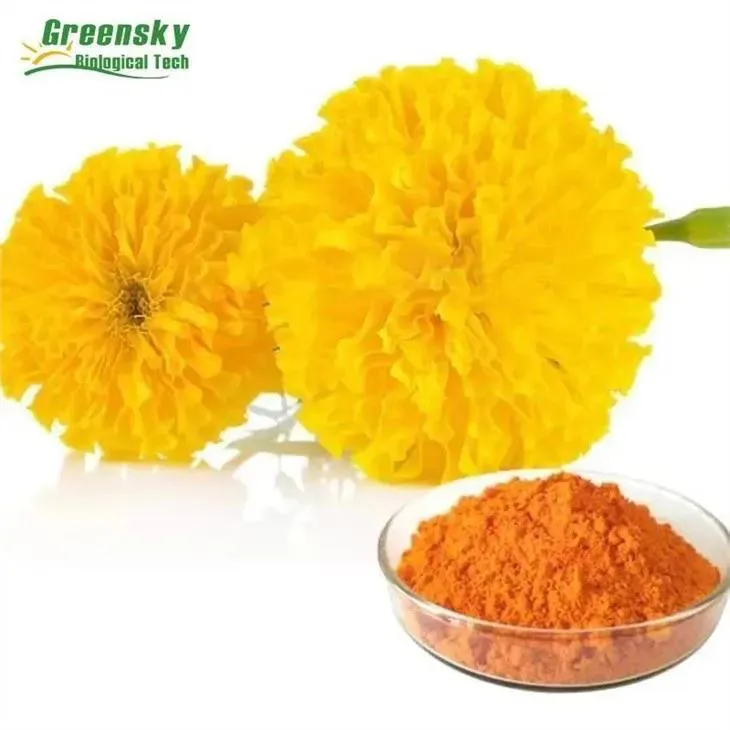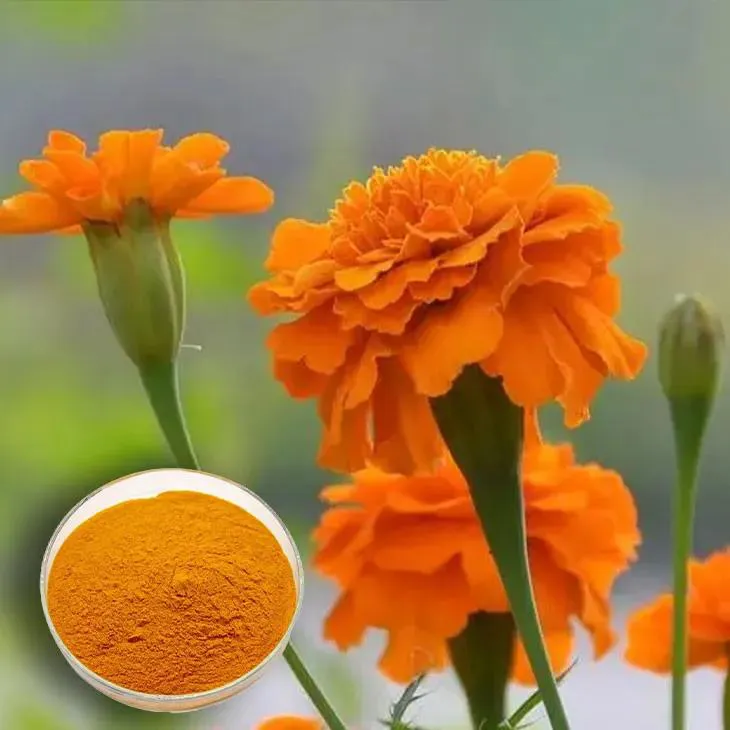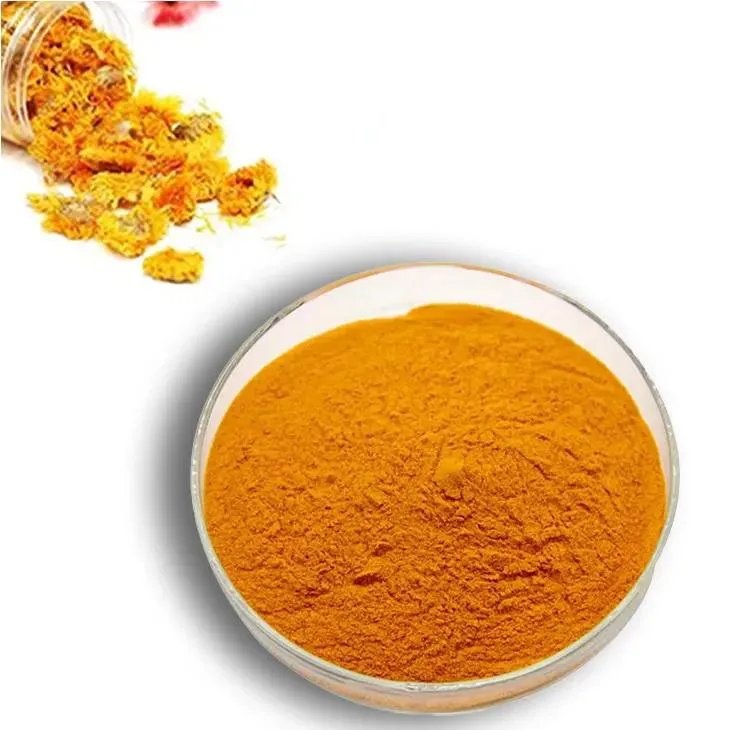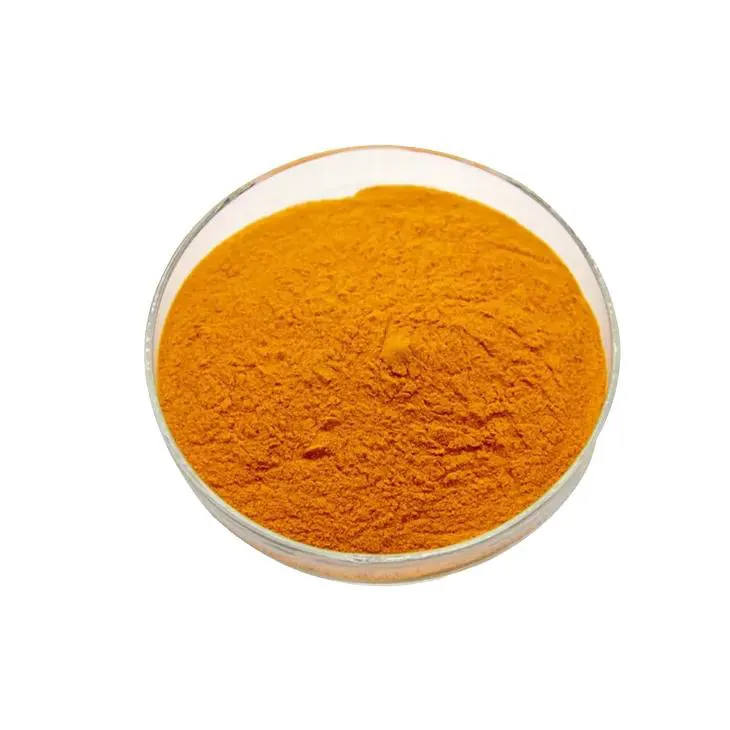- 0086-571-85302990
- sales@greenskybio.com
Benefits of Marigold Extract in Cattle Feed.
2024-11-13

Introduction
Marigold Extract has emerged as a valuable component in cattle feed in recent years. It is derived from marigold flowers, which are known for their vibrant colors and rich chemical composition. The extract contains a variety of bioactive compounds that can have a profound impact on cattle health, productivity, and the quality of the products they yield. This article will explore the multiple benefits of Marigold Extract in cattle feed in detail.

1. Nutritional Composition of Marigold Extract
Marigold extract is rich in several important nutrients and bioactive substances. One of the key components is lutein, a type of carotenoid. Lutein is known for its antioxidant properties, which play a crucial role in protecting cells from oxidative damage. In addition to lutein, marigold extract also contains other carotenoids such as zeaxanthin.
These carotenoids are not only important for the health of the cattle but can also be transferred to the products they produce. For example, they can influence the color and nutritional value of beef and milk. Besides carotenoids, marigold extract may also contain vitamins, minerals, and other bioactive compounds that contribute to its overall beneficial effect on cattle.

2. Boosting Cattle Immunity
2.1. Antioxidant Activity
The antioxidant activity of marigold extract is a major factor in enhancing cattle immunity. Oxidative stress can lead to a weakened immune system in cattle. The carotenoids in marigold extract, such as lutein and zeaxanthin, act as antioxidants by scavenging free radicals. Free radicals are unstable molecules that can damage cells and tissues, and their accumulation can make cattle more susceptible to diseases.
By neutralizing these free radicals, marigold extract helps to maintain the integrity of cells in the cattle's body. This, in turn, enables the immune system to function more effectively. For example, it can support the proper functioning of immune cells such as lymphocytes and macrophages, which are responsible for identifying and eliminating pathogens.
2.2. Anti - inflammatory Effects
Marigold extract also exhibits anti - inflammatory properties. Inflammation is a natural response of the body to injury or infection, but chronic inflammation can be detrimental to cattle health. The bioactive compounds in marigold extract can help to modulate the inflammatory response.
They can reduce the production of pro - inflammatory cytokines, which are signaling molecules that promote inflammation. By doing so, marigold extract can help to prevent excessive inflammation and promote a more balanced immune response. This is especially important in situations where cattle may be exposed to various stressors or pathogens in their environment.

3. Influence on Beef Quality
3.1. Color and Appearance
The carotenoids present in marigold extract can have a significant impact on the color of beef. Beef with a more appealing color is often more marketable. The lutein and other carotenoids are deposited in the muscle tissue of cattle, giving the beef a more desirable reddish - orange hue.
This is in contrast to beef that may appear pale or dull in color, which can be less attractive to consumers. A more vibrant color can also give the impression of freshness and higher quality. In addition to color, marigold extract may also contribute to the overall appearance of the beef by improving the texture and marbling, although further research is needed in this area.
3.2. Nutritional Value
Marigold extract can enhance the nutritional value of beef. As mentioned earlier, it contains important nutrients and bioactive compounds. When cattle consume marigold extract - supplemented feed, these beneficial substances can be incorporated into the beef.
For example, the carotenoids in marigold extract have antioxidant properties that are retained in the beef. Consumers who consume beef from marigold - fed cattle can benefit from these antioxidants, which are known to have health - promoting effects in humans, such as reducing the risk of certain chronic diseases.

4. Influence on Milk Quality
4.1. Color and Composition
Similar to its effect on beef, marigold extract can influence the color of milk. The carotenoids can give the milk a slightly yellowish tint, which is a natural indication of its nutrient - rich content. In some cases, consumers may prefer milk with a more pronounced color, as it is associated with higher quality.
In terms of composition, marigold extract can potentially increase the levels of certain beneficial compounds in milk. For example, it may enhance the presence of antioxidants, vitamins, or other bioactive substances. This can make the milk more nutritious and valuable for human consumption.
4.2. Shelf - Life
The antioxidant properties of marigold extract can also have an impact on the shelf - life of milk. Oxidation is one of the main factors that can cause milk to spoil. By reducing oxidative stress in the milk, marigold extract can help to extend its freshness and usability.
This can be beneficial for dairy producers, as it can reduce losses due to spoilage and allow for longer storage and distribution times. It can also be advantageous for consumers, as they can enjoy fresher milk for a longer period.
5. Digestive Health of Cattle
Marigold extract can have a positive impact on the digestive health of cattle. It may help to improve the function of the gastrointestinal tract. Some of the bioactive compounds in marigold extract can stimulate the growth of beneficial gut bacteria.
These beneficial bacteria play a crucial role in digestion, as they help to break down feed components, such as fiber, more efficiently. By promoting a healthy gut microbiota, marigold extract can contribute to better nutrient absorption in cattle. This can lead to improved growth rates and overall health of the animals.
6. Stress Reduction in Cattle
Cattle are often exposed to various stressors in their environment, such as changes in temperature, handling procedures, or feed quality. Stress can have a negative impact on their health and productivity. Marigold extract may help to reduce stress in cattle.
The anti - inflammatory and antioxidant properties of marigold extract can play a role in mitigating the physiological effects of stress. For example, it can help to reduce the production of stress hormones, such as cortisol, which can have harmful effects on the cattle's body. By reducing stress, marigold extract can help to maintain the well - being of cattle and optimize their performance.
7. Dosage and Administration
When using marigold extract in cattle feed, it is important to determine the appropriate dosage. The dosage may vary depending on factors such as the age, weight, and health status of the cattle.
- For young calves, a lower dosage may be sufficient, as their digestive systems are still developing.
- In contrast, adult cattle may require a higher dosage to achieve the desired benefits.
- The form of marigold extract also matters. It can be available as a powder, liquid, or encapsulated form. The administration method should be chosen based on the form of the extract and the practicality of its use in the feed.
It is also crucial to ensure that the marigold extract is of high quality and free from contaminants. Regular monitoring of the cattle's health and performance is recommended when introducing marigold extract into their feed to ensure that it is having the desired effect.
8. Conclusion
In conclusion, marigold extract offers a wide range of benefits when included in cattle feed. It can enhance cattle immunity, improve the quality of beef and milk, promote digestive health, and reduce stress in cattle. The various bioactive compounds present in marigold extract, such as carotenoids, play a key role in these beneficial effects.
However, further research is still needed to fully understand all the mechanisms by which marigold extract affects cattle and to optimize its use in different farming situations. With proper dosage and administration, marigold extract has the potential to be a valuable addition to cattle feed, contributing to more sustainable and productive cattle farming.
FAQ:
What are the main bioactive compounds in marigold extract?
Marigold extract contains compounds such as flavonoids, carotenoids (especially lutein and zeaxanthin). These bioactive compounds are responsible for many of its beneficial effects in cattle feed.
How does marigold extract improve cattle immunity?
The bioactive compounds in marigold extract can stimulate the immune system of cattle. For example, flavonoids may have antioxidant and anti - inflammatory properties, which can help the body's defense mechanisms to function better, reducing the risk of infections and diseases.
Can marigold extract change the taste of beef and milk?
There is currently no evidence to suggest that marigold extract significantly changes the taste of beef and milk. Instead, it is more likely to enhance their nutritional value. However, more research may be needed to fully understand any potential impacts on flavor.
What is the recommended dosage of marigold extract in cattle feed?
The recommended dosage can vary depending on factors such as the age, weight, and health status of the cattle. Generally, it should be determined based on scientific research and veterinary advice. Some studies suggest that a certain percentage (usually a relatively small amount) added to the overall feed composition can be beneficial, but precise dosages need further investigation for optimal results.
Are there any potential side effects of using marigold extract in cattle feed?
When used within appropriate limits, marigold extract is generally considered safe. However, excessive use may potentially lead to some issues. For example, it could disrupt the balance of nutrients in the feed if not properly dosed. Also, in rare cases, individual animals may have an allergic or adverse reaction, but this is not common.
Related literature
- The Role of Marigold Extract in Animal Nutrition"
- "Beneficial Effects of Bioactive Compounds from Marigold on Cattle Health"
- "Marigold Extract: A Promising Additive in Livestock Feed"
- ▶ Hesperidin
- ▶ citrus bioflavonoids
- ▶ plant extract
- ▶ lycopene
- ▶ Diosmin
- ▶ Grape seed extract
- ▶ Sea buckthorn Juice Powder
- ▶ Beetroot powder
- ▶ Hops Extract
- ▶ Artichoke Extract
- ▶ Reishi mushroom extract
- ▶ Astaxanthin
- ▶ Green Tea Extract
- ▶ Curcumin Extract
- ▶ Horse Chestnut Extract
- ▶ Other Problems
- ▶ Boswellia Serrata Extract
- ▶ Resveratrol Extract
- ▶ Marigold Extract
- ▶ Grape Leaf Extract
- ▶ blog3
-
High purity olive leaf extract
2024-11-13
-
Lavender oil extraction method
2024-11-13
-
100% organic virgin sea buckthorn fruit oil
2024-11-13
-
Lotus leaf extract powder factory in China
2024-11-13
-
China aged garlic extract supplier
2024-11-13
-
Deer antler extract powder manufacturer
2024-11-13
-
Saw palmetto extract vs whole herb
2024-11-13
-
Apricot Powder
2024-11-13
-
Astaxanthin
2024-11-13
-
Motherwort Extract
2024-11-13
-
White Willow Bark Extract
2024-11-13
-
Phyllanthus Emblica Extract
2024-11-13
-
Grapefruit Seed Extract Powder
2024-11-13
-
Genistein
2024-11-13
-
Hedyotis Diffusa Extract
2024-11-13
-
Feverfew Extract
2024-11-13
-
Kupilu Extract
2024-11-13





















